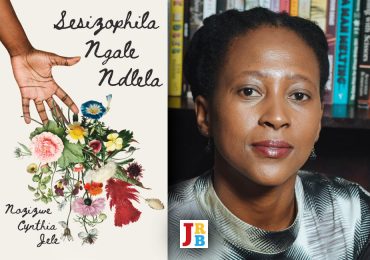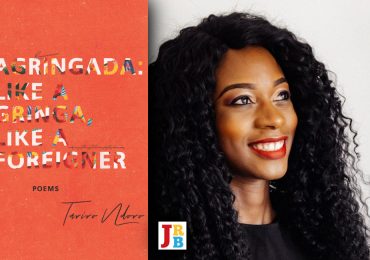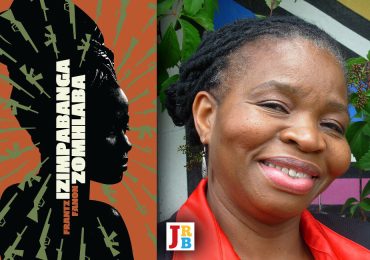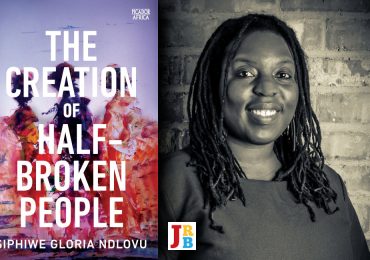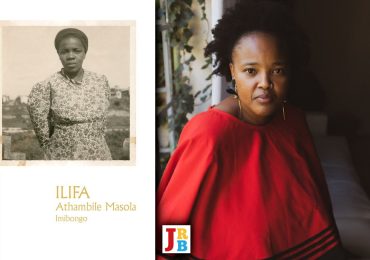The JRB’s Poetry Editor Rustum Kozain was in conversation with PR Anderson at the launch of Anderson’s new book, In a Free State: A Music at The Book Lounge, Cape Town, 28 November 2018. Here we present an edited excerpt from their conversation.
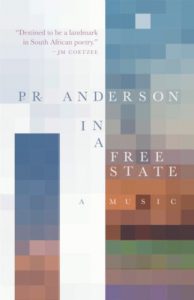 In a Free State: A Music
In a Free State: A Music
PR Anderson
uHlanga Press, 2018
Rustum Kozain for The JRB: I’m not going to focus on any thematic or content concerns of the poem—and I call it a poem, as a whole, rather than discrete poems—because it ranges over a wide field: ancient history, colonial history; there are extracts from old colonial texts and newspapers, but there are also personal and private moments in the poem, which I imagine is a conversation you’re having with yourself, or perhaps with a loved one, I don’t know; there are also moments of self-reflexivity where you’re addressing the art of poetry itself. So it’s a wide-ranging poem and any attempt to summarise it would be futile.
What struck me most are its sonic qualities, and also the language. Initially I thought that you had embarked on a different path from what you were doing in your previous volumes. I looked at some of the poetry in Foundling’s Island (2007), but there are glimmerings of your voice—I mean, your voice is still the same, but there’s a kind of new enlivening in the language, which is the part that I am envious of. There’s an electricity in the book, a verve; there’s a forcefulness. These are elements that I found in Foundling’s Island, but that then emerge with a bigger force in this new book, in terms of your voice and the ways in which you employ and break language, and play with language. It heaves. There’s all sorts of energy.
So I want to ask: To what extent was there any kind of deliberateness or consciousness in it? And I ask this as someone who writes as well, and as someone who has grown tired of their own voice and with their own tricks, in a way. Was there a deliberateness in any of the newness with which you approached the writing?
PR Anderson: I think that that’s exactly the level at which I would want to address my first kinds of thoughts about the book and I suspect that the reason I’m delighted it’s you that I’m talking to is that we’re poets of an age, and we’re poets of, unfortunately at this point, middle age, and there is a kind of mid-life crisis which arises when you look back at what you’ve written and are able to say to yourself: Yes, there are these and those accomplishments in what I’ve done, I ticked certain boxes, but have I found my voice? And there’s a scary answer number one, which is: No, I haven’t. Which means I’m not a poet at all. Scary answer number two is: Yes, I have. But it has the scariest implication of all, which is: I don’t like it; it doesn’t sound like my voice in any case, in any way. And this book was, discernibly for me, an attempt to try and push through what was becoming for me a kind of scholastic, rather sort of schoolman’s, kind of poetry.
The germinal point of the book lies in some five to eight kilometre runs that I did about twenty years ago [light audience laughter], in which I decided that I was going to be a Modernist, not a Postmodernist, and that I was going to therefore be retrograde and formalist, and that my interests were much more sonic and musical, fundamentally, than in the kind of confessional or engaged modes that were, I suppose, to the fore of my mind. I wanted to write an elegy, for somebody who died. I, over time, decades eventually since the death of that person, realised that the Free State—that central part of South Africa that’s landlocked, and nothing and nowhere, and everything, and we’ve all got to go through it at some point, in some sense being also the place where this person had died—could form the node of concentricity around which an elegy for so much that we might want to be elegiac about in this country could reform and conform itself rather carefully.
I didn’t want to posture as a writer of engagement. I think that the subject matter to which you referred is elusive, in multiple senses of the word: elusive, it eludes you; but it’s also illusive—it is eluding a kind of grasp. And it is allusive—it alludes to things. And so on and so forth. At no point does it break through to anything closer, I think, than a position of witness. What I’ve hoped to do to sustain a kind of metaphor which runs throughout the book, a geological metaphor, I’ve hoped to take a pickaxe to the landscape of the heart of the country and to try and expose whatever fissures and dykes and sills and so on—the different, lost, rumourous voices of the land can still, as it were, push to the surface and state themselves, I hope, without becoming entirely my own along the way.
Rustum Kozain: I’m glad you brought up Modernism. I know it’s going to sound predictable, but I did, when reading the poem, think of The Waste Land. Now, in some circles that may be praised; in other circles that may be an indictment. I’m nervous of sounding hyperbolic, but I do think of In A Free State as a kind of Waste Land, in the sense that it’s fragmentary, yet there’s the unifying voice of the poet or speaker behind it; it’s fragmentary and trying to take the temper of the times, but in those allusive ways.
PR Anderson: The Waste Land looms large in the poem for the obvious reason that the Free State is in a sense that waste land, whether personally, of the heart, or of the South African condition. But I was also tremendously overpowered while writing it by Sol Plaatje’s Native Life in South Africa, in the sense of the vast displacement and the waste land that arose at very much the same time as Eliot was writing The Waste Land. But the very beginning of the book makes a direct reference to this, my referring to April:
Come April and the cosmos
resumes the ditches, flushing
seeps that were hidden or hid
their transient crake, where frogs woke,
—so now there’s paint spilled, lying
on the broken ground, whitewash,
rose-wash, eyewash, lovely cold
as the coming days …
So, there’s both a poetic debt, but there’s also a psycho-social debt to The Waste Land that I couldn’t get around.
Rustum Kozain: We are Postmodernists in a literal sense in that we came of age in the nineteen-seventies and nineteen-eighties, when Modernism was already long past. So we’re Postmodernists only literally. But we’re Modernists because we’re Postmodernist.
PR Anderson: Yes …
Rustum Kozain: … no, because our influences remain Modernist.
PR Anderson:: Yes, it’s Modernism that we’re Posts …
Rustum Kozain: If we think historically, with Modernism being the cultural wave that coincides with the build up to World War I, and then the build up to World War II—in the beginning of a new century. And we are at the beginning of a new century—we can think about international tensions and prospects of war. I do think we live in a parallel age, where the virtues of Modernism in literature and art can speak to the times better than that radical, senseless relativism of Postmodernism.
PR Anderson: Yes, I concur with that. For me there’s always been a compression in the Modernist moment of the turn of the past century which has been lost in the sprawling delta of largely personal confessionalism in the Postmodern era. I don’t think we can afford that any longer. One of the themes—if one wants to call it that; I’ve spoken about it as a metaphorical spine in the book all the way through—is a sense of geological time, and although I don’t address the contemporary ecocide directly, this is not really the time for a poetry of reflexivity, of navel-gazing. In some sense, there are some urgent questions to ask. In this book I’m not sure I come close to any answers, but I do put forward certain voices posing questions about what the meaning or meaninglessness of their life might be against a vast and imposing and, at times, dispiriting and awe-inspiring landscape. Which is to say, that inhabited space of the human mind, but also the geo-spatial phenomenon which is the centre of Southern Africa.
Rustum Kozain: There’s no linear narrative, there’s no exposition that can orient the reader, and I’m wondering, was it a concern at all, as you were writing? Did you have a concern that readers won’t ‘get it’ and that therefore you might be lost?
PR Anderson: Yes, I did. And that’s why it’s subtitled ‘A Music’. I’m very insistent on the fact that this is a text that you would get the way that you would get a symphony or a piece of music, rather than the way that you would get a railway timetable or the text on the back of a pack of cornflakes. In other words, it’s a text to be apprehended, not comprehended, and it makes a kind of strange, striking, discordant music.
It has the fragment of a narrative, of a young girl—who was initially me, but needed not to be me, so she changed her sex—who runs away from a foiled, very young love, into the Free State, disappears and becomes, as far as I can tell, I’m not sure, a burnt owl. There are excurses into the geology of the landscape; there are descriptions of the platteland-heid of the Free State itself; and there are strange moments following the success and failure perhaps of sharecroppers in the wake of the Native Land Act of 1913; there’s a funeral taking place at some point; there seems to be a text which looks like the deposition of Khoisan informants to missionaries, à la Bleek and Lloyd. I’ve hoped to cobble out of these an assembled music. But the poem points into all sorts of directions and I can only say that if it disorients at the level of content, the reader should plunge on. My ideal reader would read this through in a single reading. It’s musical at that level, rather than an anthology to be dipped into for the discrete texts that we expect poems to be. This is a single text. It’s a work of music in language. Ezra Pound said poetry is language set to music. I say poetry is music, nothing more.
Rustum Kozain: In #42, there a political glimmering in the poem.
PR Anderson: Yes, #42 refers to a moment when the great, really foundational Sotho chief, Moshoeshoe, although paramount, goes to a cousin and says—at the time of what we would call, inland, the Difaqane—and says: We need to enter into an alliance if we are going to deal with these Ntwane hordes which are spilling into our heartland. And this is a fictionalised conversation where he comes and says: Look, I’m metonymically stronger, but we need to enter into an alliance.
I’m cheating my reader by not having a footnote explaining that, but on the other hand, in a sense I’m redeeming them from trying to then join dots which would lend them a kind of false hope that they could construe a sense out of the political narration that’s going on here.
Rustum Kozain: I had no idea that it is a reference to colonial-period history. As far as I was concerned, it spoke immediately to the present time.
PR Anderson: Well, I don’t want to appropriate colonial voices, or uncolonised voices—colonising voices in ways that are other than at the most generally human level.
Rustum Kozain: It’s not an issue of appropriation I want to address at all. I was thinking more in terms of—I was just wondering—there’s something in the poem that wants to say: ‘I have a viewpoint, a moral viewpoint and I am going to give it despite what circumstances may allow or disallow.’
PR Anderson: Any elegy is in itself an appropriation. One’s taking the life of someone who’s lost their life and turning it into discourse that accords one power and favour, one way or the other. Buried under here are layers of anger and distress and confusion and attempts at trying to bring my reality and the reality of a dead woman who died under potentially suspicious political circumstances in the nineteen-eighties in the Orange Free State together with the continuities of the horrors that have surrounded a very beautiful part of the world. And I don’t think that I could begin to, in our current political, literary-political context, in any good conscience, make those claims at the level of writing a poem purely of content. I have felt much more comfortable scoring language as music in an attempt to reach the human heart through a series of sonic nudges and bumps, hopefully to affect a kind of reckoning with the sadness and the wonder, and the awe.
Rustum Kozain: Form is political.
PR Anderson: It is.
- Rustum Kozain is The JRB Poetry Editor. He is the author of This Carting Life (2005) and Groundwork (2012), both of which won the Olive Schreiner Prize, as well as, respectively, the Ingrid Jonker Prize and the Herman Charles Bosman Award. His poetry has been published in translation in French, Indonesian, Italian and Spanish. Follow him on Twitter.

